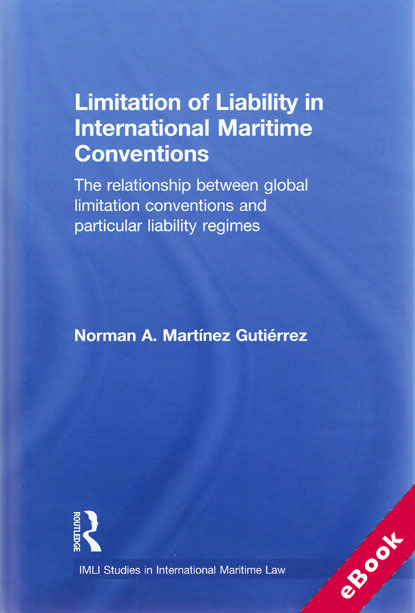
The device(s) you use to access the eBook content must be authorized with an Adobe ID before you download the product otherwise it will fail to register correctly.
For further information see https://www.wildy.com/ebook-formats
Once the order is confirmed an automated e-mail will be sent to you to allow you to download the eBook.
All eBooks are supplied firm sale and cannot be returned. If you believe there is a fault with your eBook then contact us on ebooks@wildy.com and we will help in resolving the issue. This does not affect your statutory rights.
Limitation of liability for maritime claims is a concept of respectable antiquity which is now deeply entrenched in the maritime industry. Under this concept, the shipowner is entitled to limit his liability for maritime claims up to a maximum sum regardless of the actual amount of the claims.
The concept of limitation of liability has been adopted by many conventions ranging from those relating to the carriage of goods by sea, carriage of passengers and their luggage by sea, liability and compensation for pollution damage, to liability for the removal of wrecks. Each of these conventions has its own approach to limitation of liability. However, these particular liability regimes share the international arena with global limitation conventions such as the 1976 Convention on Limitation of Liability for Maritime Claims and the 1996 Protocol thereto.
This book approaches limitation of liability from an international perspective looking at a number of key conventions including the global limitation conventions, the conventions relating to the carriage of passengers and their luggage by sea (1974 Athens Convention relating to the Carriage of Passengers and Their Luggage by Sea and the 2002 Protocol thereto), conventions relating to liability and compensation for pollution damage (1969 International Convention on Civil Liability for Oil Pollution Damage and the 1992 Protocol thereto, the 1996 International Convention on Liability and Compensation for Damage in Connection with the Carriage of Hazardous and Noxious Substances by Sea and the 2010 Protocol thereto, and the 2001 International Convention on Civil Liability for Bunker Oil Pollution Damage), as well as the 2007 Nairobi International Convention on the Removal of Wrecks.
Each chapter of this book sets out to analyze provisions in the conventions which have proved to be controversial and subject to debate by courts and authors, as well as the relationship between the limitation provisions in claim specific liability conventions and in the global limitation conventions. Particular attention is also given to the persons entitled to limit liability, ships in respect of which liability can be limited, claims subject to limitation, claims excepted from limitation, basis of liability (where applicable), loss of the right to limit, and the limits of liability.
Limitation of Liability in International Maritime Conventions is of interest to academics and practicing lawyers who wish to understand the intricacies of the law of limitation.